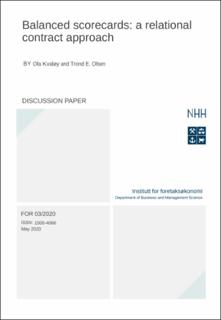| dc.description.abstract | Reward systems based on balanced scorecards typically connect pay to an index, i.e. a weighted sum of multiple performance measures. However, there is no formal incentive model that actually describe this kind of index contracts as an optimal solution. In this paper, we show that an index contract may indeed be optimal if performance measures are non-verifiable so that the contracting parties must rely on self-enforcement. Under standard assumptions, the optimal self-enforcing (relational) contract between a principal and a Multitasking agent is an index contract where the agent gets a bonus if a weighted sum of performance outcomes on the various tasks (the index) exceeds a hurdle. For a parametric (multinormal) specification, the efficiency of the contract improves with higher precision of the index measure, since this strengthens incentives. Correlations between measurements may for this reason be beneficial. For a similar reason, the principal may also want to include verifiable performance measures in the relational index contract in order to improve incentives. | en_US |
